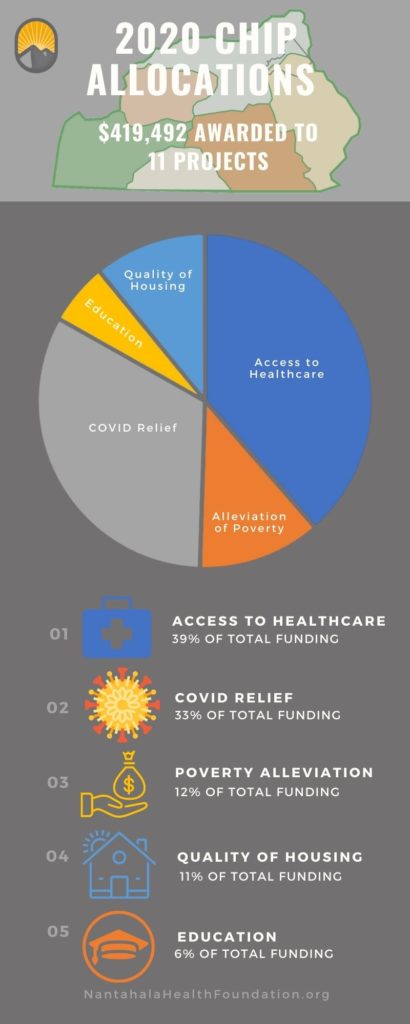December 3, 2020
Nantahala Health Foundation has announced its intent to award 11 Collaborative Health Innovation Project (CHIP) grants this month totaling nearly $420,000 to Western North Carolina nonprofits and public service organizations in support of programs seeking to achieve better health and wellness outcomes for regional residents.
The success of each awarded proposal depends on the applying organization teaming up with at least one collaborating partner. Likewise, each winning proposal will seek to apply a unique approach to eliminating root-cause barriers to health and wellness, according to Nantahala Health Foundation Executive Director Lori Bailey.
“At its most fundamental, Nantahala Health Foundation’s mission to serve as a catalyst for innovation and collaboration within the region framed the criteria for our first-ever CHIP grant awards,” Bailey said. “Through this grant review process, we were excited to discover so many collaborative and innovative projects already at work addressing social determinants of health and even more thrilled at the possibility of expanding upon this important work. We also believe it is important to support nonprofits working to address new or expanding needs as a direct result of COVID-19.”
Organizations awarded CHIP funding are working to improve the health of individuals in Cherokee, Clay, Graham, Swain, Jackson and Macon counties, as well as on the Qualla Boundary. Additionally, CHIP grant funds were awarded in support of programs designed to address NHF’s funding priorities, which include access to healthcare, education, transportation, alleviation of poverty, and quality of housing. These and many other social determinants of health are known to directly impact up to 50% of an individual’s health outcomes over their live time. Additionally, COVID-19 was added as a special interest priority area to help nonprofits expand or sustain services impacted by the pandemic.
“An ever-growing body of research has proven that where and how a person lives, learns, works and plays far exceeds cumulative clinical visits when it comes to determining health outcomes,” said Jane Kimsey, NHF’s board chair and lifelong Macon County resident. “That’s why Nantahala Health Foundation has chosen to work with organizations specifically addressing social determinants of health as a way of improving wellness for all in Western North Carolina.”
CHIP grant funds were awarded to organizations in these categories:
ALLEVIATION OF POVERTY
· Guiding Sheep Ministries – To address food insecurity in Swain and Jackson counties through education and production of nutritious foods with an emphasis on the elderly by taking into consideration their special needs.
ACCESS TO HEALTHCARE
· HIGHTS – To acquire additional staff to support a growing number of Jackson County youth in need of mental health and other supportive services, including access to food and educational support, especially in situations where traditional access has been limited by COVID-19 safety measures.
· Hospice House Foundation of WNC – To address three healthcare concerns in far Western North Carolina, including lack of quality end-of-life in-patient care, access to mental health support, and health risks of caregiving.
· Swain County Health Department – To provide access to dental services for underinsured residents of Swain County.
· Mountain Area Health Education Center – To hire a community health worker to support members of the Eastern Band of Cherokee Indians through culturally responsive community outreach that promotes trust in COVID-related information and services, such as testing, and increases connections to primary care and social and economic resources.
EDUCATION
· Swain County Cooperative Extension – To renovate the Swain County Extension Teaching Kitchen, where community residents are invited to learn nutritional literacy and cooking skills.
QUALITY OF HOUSING
· Southwestern Commission – To leverage funding from other sources, which, in turn, will expedite the launch of the Southwestern North Carolina Housing Consortium.
COVID-19 RELIEF
· Clay County Community for Students – To address needs related to education, economic stability and health as they relate to community well-being in light of COVID-19 safety measures.
· Macon Program for Progress – To address expanded food insecurity in Macon County exacerbated by COVID-19 by delivering food and supplies to low-income and disadvantaged individuals and families.
· Nantahala Regional Library – To expand remote learning and internet availability in response to COVID-19’s impact on Cherokee, Graham and Clay counties; to purchase network devices to expand the library’s outdoor WiFi range; and to purchase laptops for The Learning Center Charter School’s remote learning and for curbside use at these library locations.
· REACH of Macon County – To ensure on-site academic tutors are available to serve as liaisons between parents and Macon County Schools/teachers and can work with families to provide support on virtual learning days as a result of COVID-19 safety measure.
Soon after their establishment in early 2019, Nantahala Health Foundation’s Board of Directors focused on strategic planning and information gathering. After hosting an extensive series of listening sessions designed to identify issues challenging Western North Carolina, they defined their priorities and set about allocating funds in support of achieving their mission.
NHF’s 2020 Collaborative Health Innovation Program, during which awards were capped at $50,000 each, marks the organization’s third completed grant cycle with a collective community investment to date of nearly $2.2 million in support of social determinants of health.

